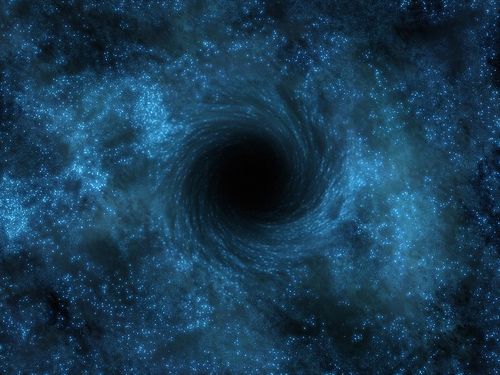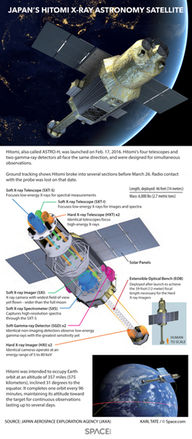It looks like you're using an Ad Blocker.
Please white-list or disable AboveTopSecret.com in your ad-blocking tool.
Thank you.
Some features of ATS will be disabled while you continue to use an ad-blocker.
8
share:
Tokyo (AFP) - Dozens of space scientists are desperately scouring the skies after losing track of a quarter-of-a-billion-dollar Japanese satellite that was sent to study black holes. The ultra-high-tech "Hitomi" -- or eye -- satellite was supposed to be busy communicating from orbit by now, the Japan Aerospace Exploration Agency (JAXA) said, but no one can say exactly where it is.
news.yahoo.com...
en.wikipedia.org...( Hitomi )
science.nasa.gov... ( Hitomi )

Interesting Black hole articles .
Are black holes the source of dark matter ?
www.dailygalaxy.com...
Phantom Black holes ?
www.dailygalaxy.com...
edit on 28 3 2016 by skywatcher44 because: Added Link
edit on 28 3 2016 by skywatcher44 because: Added
Link
a reply to: skywatcher44
Probably a circuit malfunction. The Sun is something to watch out for if you're a circuit board in space.
I doubt it fell into a black hole. I doubt there's any black holes around Earth strong enough to engulf a whole satellite. Not because you're an unicorn hunter means that you'll necessarily get impaled by an unicorn. (Not saying black holes are unicorns, just making a logical analogy).
I hope they find it, S&F for sharing!
Probably a circuit malfunction. The Sun is something to watch out for if you're a circuit board in space.
I doubt it fell into a black hole. I doubt there's any black holes around Earth strong enough to engulf a whole satellite. Not because you're an unicorn hunter means that you'll necessarily get impaled by an unicorn. (Not saying black holes are unicorns, just making a logical analogy).
I hope they find it, S&F for sharing!
edit on 28-3-2016 by swanne because: (no reason given)
originally posted by: Jonjonj
a reply to: skywatcher44
The scope for jokes with this story are infinite. Thanks for the story!
Kind of like the density of the singularity in the black hole.
edit on 28-3-2016 by 3danimator2014 because: (no reason given)
That's a shame. I imagine they are fairly disappointed. Hope for the best, prepare for the worst.
-Alee
-Alee
originally posted by: swanne
a reply to: skywatcher44
Probably a circuit malfunction. The Sun is something to watch out for if you're a circuit board in space.
I doubt it fell into a black hole. I doubt there's any black holes around Earth strong enough to engulf a whole satellite. Not because you're an unicorn hunter means that you'll necessarily get impaled by an unicorn. (Not saying black holes are unicorns, just making a logical analogy).
I hope they find it, S&F for sharing!
Well.... Blacks holes arent unicorns..... Unicorns are black holes..... Its true because Chaaaarlie said so
Seems like they found it, but it's not good news:
phenomena.nationalgeographic.com...
phenomena.nationalgeographic.com...
A new video shows Japan’s troubled Hitomi spacecraft tumbling in orbit. As the satellite crosses the screen (from right to left), it varies wildly in brightness—which means it’s shooting unstably through space
If I was in charge of the space agency I would not spend my tax subsidy on theoretical research only such as black hole research. What we need is
money spend on practical research such as how to colonize and terraform planets and how to improve human travel through space. Once we got Mars
colonized we will have all the time of the World(s) to study the Universe. Priorities
Although I must admit I cannot say what the practical implications of blackhole research are, maybe my ignorance on the subject will make me look like a fool. If that is the case, forgive me.
Although I must admit I cannot say what the practical implications of blackhole research are, maybe my ignorance on the subject will make me look like a fool. If that is the case, forgive me.
a reply to: JohnSmith77
Prioritising expenditure is difficult, but Japan doesn't only spend its money on this kind of thing - its lunar probe providing stunning imagery and large amounts of data. It also wasn't just looking at black holes, that's just the thing that the popular science media have latched on to.
If you want theoretical stuff to become factual knowledge, then you have to investigate it. Only by investing in the correct tools can you investigate it properly. Who knows what knowledge you may reveal and how useful it could be?
Prioritising expenditure is difficult, but Japan doesn't only spend its money on this kind of thing - its lunar probe providing stunning imagery and large amounts of data. It also wasn't just looking at black holes, that's just the thing that the popular science media have latched on to.
If you want theoretical stuff to become factual knowledge, then you have to investigate it. Only by investing in the correct tools can you investigate it properly. Who knows what knowledge you may reveal and how useful it could be?
What a disappointment... I'da thought they would of mapped a trajectory to avoid any collisions for the satellite, I suppose they can't know about
everything floating around out there.
Hitomi Satelite
This satellite was impressive and has a wonderful story/legend behind its four xrays.
Hitomi Legend

leolady
"Because the orbit of Hitomi is quite stable it is relatively easy to track. In fact, if the sky clears up I will be attempting additional video beginning tonight," Maley told Space.com in an email today, adding that he will be watching for any changes in its rotation. "So far, it remains unchanged at a bit over 10 seconds between major flashes. These peak flashes can reach + 3 magnitude (or slightly dimmer than the North Star) but are brief. Between these major flashes there are minor ones but the satellite is also invisible during each major flash cycle as well. My video does reveal that." - See more at: www.space.com...
Hitomi Satelite
This satellite was impressive and has a wonderful story/legend behind its four xrays.
In a short press release JAXA says that there is an ancient legend that inspires the name Hitomi. “One day, many years ago, a painter was drawing four white dragons on a street. He finished drawing the dragons, but without “Hitomi”. People who looked at the painting said “why don’t you paint Hitomi, it is not complete! The painter hesitated, but people pressured him. The painter then drew Hitomi on two of the four dragons. Immediately, these dragons came to life and flew up into the sky. The two dragons without Hitomi remained still. (Put Hitomi of Dragon in the drawing).”
JAXA says that the inspiration of this story is that Hitomi is regarded as the “One last, but most important part”, and so it wishes ASTRO-H to be the essential mission to solve mysteries of the universe in X-rays. Hitomi refers to the aperture of the eye, the part where incoming light is absorbed.
“From this, Hitomi reminds us of a black hole. We will observe Hitomi in the Universe using the Hitomi satellite!” JAXA notes.
Hitomi Legend

leolady
originally posted by: JohnSmith77
If I was in charge of the space agency I would not spend my tax subsidy on theoretical research only such as black hole research. What we need is money spend on practical research such as how to colonize and terraform planets and how to improve human travel through space. Once we got Mars colonized we will have all the time of the World(s) to study the Universe. Priorities
Although I must admit I cannot say what the practical implications of blackhole research are, maybe my ignorance on the subject will make me look like a fool. If that is the case, forgive me.
There are no direct practical applications. But the knowledge we would have gained about the workings of our universe..well who knows what might have come out if it.
As it stands, our terraforming needs equal our black hole needs in my opinion. As in, we don't NEED either any time soon. And black holes are a heck of a lot more interesting than terraforming. Let the guys lower down on the science food chain (geologists) worry about that.
Joke
Anyone know about where I can find out if it will be blinking above london anytime soon?
Heavens above don't have it listed.
Heavens above don't have it listed.
originally posted by: wildespace
a reply to: OneBigMonkeyToo
Russian news site told that it actually exploded.
That would likely happen if anyone tried to put a conventional, visible light telescope in space too.
originally posted by: GaryN
originally posted by: wildespace
a reply to: OneBigMonkeyToo
Russian news site told that it actually exploded.
That would likely happen if anyone tried to put a conventional, visible light telescope in space too.
Really? You never said anything about visible light telescopes exploding in your other opus of a thread. Where do you come up with this rubbish?
I would ask you about Hubble but...i don't think I can bear to hear the answer.
Update.
Source: phys.org, April 28, 2016 - Japan gives up on failed black hole research satellite
Shame. They think a solar panels ha something to do with it. $270 million down the tubes.
Japan is abandoning a quarter-of-a-billion-dollar satellite it sent to study black holes, disappointed space scientists said Thursday, after spending a month trying to save it.
...
"We concluded that the satellite is in a state in which its functions are not expected to recover," Saku Tsuneta, director general of JAXA's Institute of Space and Astronautical Science, told reporters.
"I deeply apologise for abandoning operation" of the satellite, he said.
Source: phys.org, April 28, 2016 - Japan gives up on failed black hole research satellite
Shame. They think a solar panels ha something to do with it. $270 million down the tubes.
new topics
-
George Stephanopoulos and ABC agree to pay $15 million to settle Trump defamation suit
Mainstream News: 4 hours ago -
More Bad News for Labour and Rachel Reeves Stole Christmas from Working Families
Regional Politics: 11 hours ago
top topics
-
The Mystery Drones and Government Lies
Political Conspiracies: 15 hours ago, 14 flags -
George Stephanopoulos and ABC agree to pay $15 million to settle Trump defamation suit
Mainstream News: 4 hours ago, 14 flags -
Light from Space Might Be Travelling Instantaneously
Space Exploration: 12 hours ago, 9 flags -
The MSM has the United Healthcare assassin all wrong.
General Conspiracies: 13 hours ago, 8 flags -
2025 Bingo Card
The Gray Area: 13 hours ago, 7 flags -
More Bad News for Labour and Rachel Reeves Stole Christmas from Working Families
Regional Politics: 11 hours ago, 7 flags
active topics
-
The MSM has the United Healthcare assassin all wrong.
General Conspiracies • 11 • : rickymouse -
Drones everywhere in New Jersey
Aliens and UFOs • 142 • : Zaphod58 -
Light from Space Might Be Travelling Instantaneously
Space Exploration • 23 • : rickymouse -
The Mystery Drones and Government Lies
Political Conspiracies • 69 • : DaydreamerX -
George Stephanopoulos and ABC agree to pay $15 million to settle Trump defamation suit
Mainstream News • 9 • : WeMustCare -
Pelosi injured in Luxembourg
Other Current Events • 35 • : WeMustCare -
One out of every 20 Canadians Dies by Euthanasia
Medical Issues & Conspiracies • 22 • : BernnieJGato -
They Know
Aliens and UFOs • 85 • : ARM19688 -
Nov 2024 - Former President Barack Hussein Obama Has Lost His Aura.
US Political Madness • 14 • : xuenchen -
2025 Bingo Card
The Gray Area • 15 • : onestonemonkey
8
